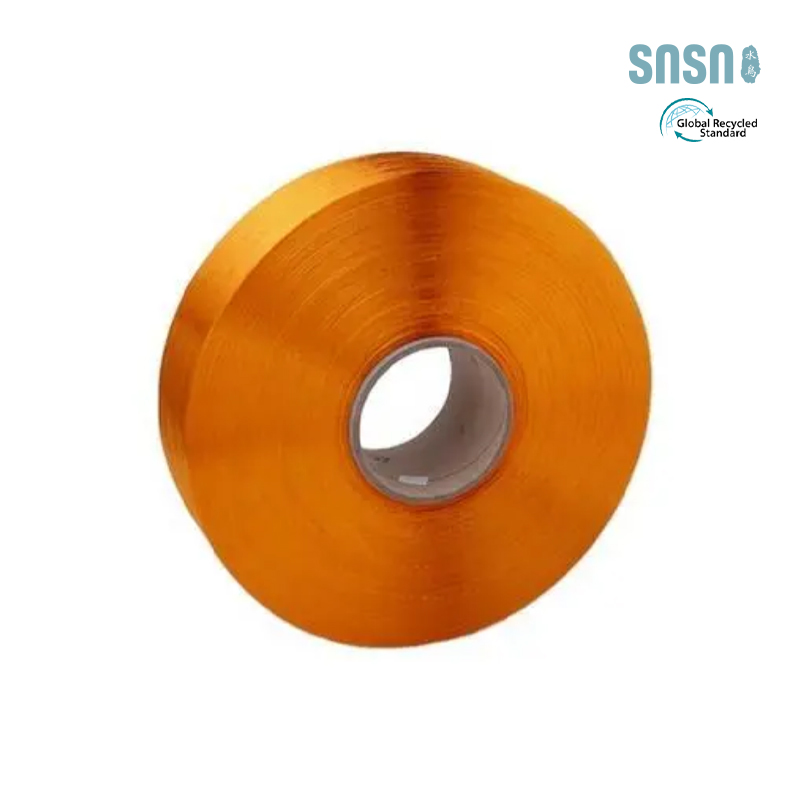In today’s rapidly evolving world, sustainability is no longer a luxury—it's a necessity. As industries strive to reduce their carbon footprints and mitigate environmental impact, one material is gaining increasing attention: Recycled POY (Partially Oriented Yarn). But what exactly is Recycled POY, and why should it matter to businesses in the textile and manufacturing sectors?
Understanding Recycled POY
Recycled POY refers to partially oriented yarn derived from post-consumer or post-industrial plastic waste, most commonly polyethylene terephthalate (PET). It is produced through a process of reprocessing waste materials—such as used plastic bottles or fabric scraps—into new fibers. These fibers are then spun into yarns, which retain much of the strength and durability of their virgin counterparts but with a significantly lower environmental cost.
POY itself is an essential intermediary product in the textile manufacturing process. It is often further processed into fully oriented yarn (FOY) and eventually transformed into fabrics used in clothing, home textiles, and industrial products. When recycled, POY offers a powerful way to close the loop on textile waste, giving new life to what would otherwise be discarded.
The Environmental Benefits of Recycled POY
The advantages of switching to recycled POY are profound. In the traditional manufacturing of virgin polyester, significant amounts of fossil fuels, water, and energy are consumed, while producing large quantities of waste and greenhouse gas emissions. In contrast, the recycling process for POY reduces these harmful effects by utilizing existing materials, requiring far less energy, and producing less waste.
By embracing recycled POY, companies can lower their reliance on petroleum-based resources, significantly decreasing the environmental impact associated with polyester production. The carbon footprint of recycled POY is notably smaller, making it an eco-friendly alternative that helps reduce the strain on our planet’s limited resources. Additionally, the use of recycled materials can contribute to a company’s sustainability goals, enhancing its brand reputation and appeal to environmentally-conscious consumers.

Recycled POY in Textile Manufacturing: An Industry Shift
The demand for recycled POY is growing, fueled by consumer awareness and increasing regulatory pressure on businesses to adopt more sustainable practices. In the fashion and textile industries, which have long been criticized for their environmental footprint, recycled POY offers a viable solution to the problem of plastic waste while meeting the needs of an ever-demanding market.
Beyond its ecological benefits, recycled POY also provides a solution for manufacturers looking to meet rising consumer expectations for eco-friendly products. As sustainability becomes a central focus for many brands, incorporating recycled materials into production processes helps companies not only comply with environmental standards but also position themselves as leaders in responsible manufacturing.
Moreover, recycled POY is versatile, with applications spanning across a wide range of products. It can be used to create everything from high-performance fabrics for activewear to durable upholstery and industrial textiles. This adaptability makes it an appealing option for manufacturers across various sectors, ensuring that the material can meet the diverse needs of the global market.
The Challenges and Future of Recycled POY
While the benefits are clear, the transition to recycled POY is not without its challenges. One key hurdle is the quality and consistency of recycled fibers. In some cases, the recycling process can lead to a reduction in the material’s performance, particularly in terms of durability and elasticity. However, advancements in recycling technology and better sorting methods are helping to mitigate these issues, ensuring that recycled POY can meet the same high standards as its virgin counterparts.
The market for recycled POY is also still developing, and while demand is increasing, the supply of high-quality recycled materials remains somewhat limited. Companies investing in the recycling infrastructure, however, are helping to accelerate this shift, making it easier for manufacturers to source recycled POY in large quantities and at competitive prices.
Recycled POY is more than just a trend—it is a critical step toward the realization of a circular economy in the textile industry. By reducing waste, conserving resources, and lowering the environmental impact of manufacturing, recycled POY offers a sustainable solution to the challenges facing the global textile sector. As technology improves and demand for eco-conscious products rises, the adoption of recycled POY will likely become a cornerstone of the industry’s commitment to environmental stewardship and responsible production.

 English
English عربى
عربى Türk
Türk Español
Español



















